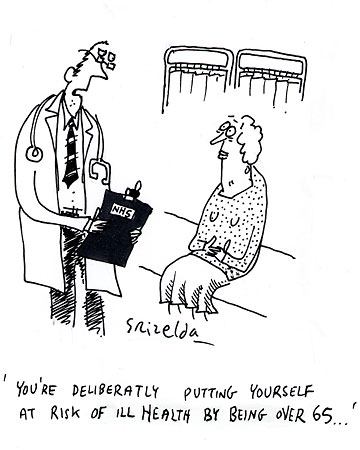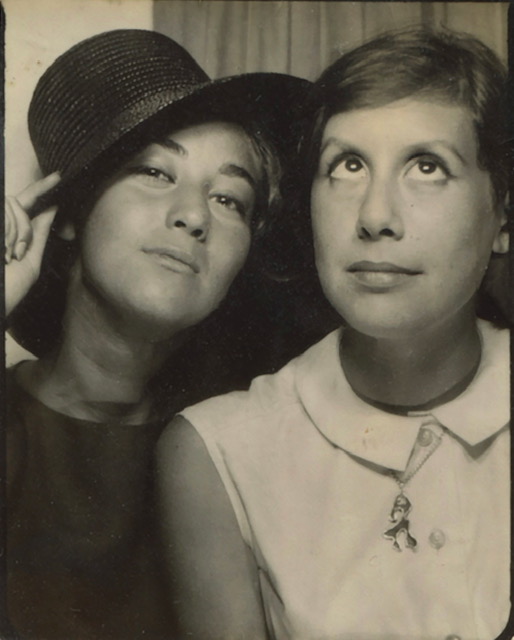How should I react when comedians on TV, or organizations I respect, make appallingly ageist jokes? I’m 83, so the joke’s on me. Should I object?
I’ve been a fan of Saturday Night Live practically since the program first aired, but I was brought up short when one of the show’s stars came out with (approximately) these lines: “I don’t like old people. I don’t think they should be allowed to vote. After all, you don’t get to order for the table if you’re about to leave the restaurant.”
Clever and funny, right? I laughed, but it also hurt. I know SNL sets out to offend virtually everybody and to make us uncomfortable by laying bare our biases, but I didn’t appreciate being reminded that I was about to “leave the restaurant.” What a way to write off older people—to tell them they no longer matter!
The Saturday Night Live joke was bad enough, but then I came across an ageist ad on YouTube not long before the 2018 midterm election. This video infuriated me, even though I understood what the people who made it were trying to do and appreciated how amusing their effort was and how well done.
The screen filled again and again with the face of an older man or woman, actors apparently chosen for their ability to look sleek and smug.
“Dear young people, don’t vote,” the first woman says.
“Everything’s fine the way it is,” a man insists.
“Trump: that was us,” a different woman confides in a conspiratorial whisper.
“He’s our guy,” a man notes, looking satisfied.
Seconds later, a woman scoffs, “Climate change? That’s a you problem. I’ll be dead soon.”
Someone else complains, “I can’t keep track of which lives matter.”
Winding up, one of the group predicts disdainfully that “you won’t vote,” and a man adds with a superior smile, “You young people never do.”
Then one by one, these elders mock the young, bragging that “We’re doing great,” and reminding them that “We’ll be at the polls and you won’t.”
The video was created by Acronym, a progressive nonprofit that mounted a multimillion dollar campaign to register new voters ahead of the 2018 midterm elections. The campaign particularly targeted young people, who were considered much less likely to vote in a midterm than those of us who are middle-aged or older.
Acronym’s video ad seemed intended to amuse as well as motivate the young, but it played on ageist stereotypes and prejudice against older people.
Granted, those stereotypes are so common and so widely accepted that many take them for fact rather than bias. And there was some truth to the message: 53 percent of voters 65 and up did cast their ballots for Donald Trump in 2016.
But they weren’t the only ones. And this utterly ageist video wasn’t harmless. There were hundreds of comments from viewers, and while a few did point out the ageism, they were digitally shouted down.
Some who commented failed to see the irony and took the video seriously. One person remarked, “This is, without a doubt, one of the best ads I have ever seen. It’s so true about old people! … This is a perfect example for why nobody should live forever. The only real way to progress and improve our society is for old people to die.”
Someone else warned that “those old people have children, grandchildren who are indoctrinated to believe as they do.” And another person observed, “so they’re voting for things they’re not even gonna be alive for?”
I was taken aback by the assumption that older people like me don’t care what happens after we’re gone—to our children, our grandchildren, our country, the planet.
Friends in my age group found the Acronym video as upsetting as I did. Such ads wouldn’t be acceptable, even as irony, if they were racist or sexist, but ageist stereotypes go right over most people’s heads. Yet they subtly erode the self-confidence of the elders they stigmatize and reinforce prejudices against us.
Did the ad work—did it send more young people to the polls? After the election, based on exit polling, experts estimated that 31 percent of Americans between 18 and 29 voted in the midterms, up from 21 percent in 2014. That’s an increase of millions of voters. In contests for House seats, about 67 percent of 20-somethings chose Democrats. Their votes may have clinched the results in some tight, key races.
But that doesn’t mean Acronym’s video ad was worthwhile despite its ageism. It was just one of a number of efforts to bring out the young vote. Survivors of the high school shooting in Parkland, FL, mounted a nationwide voter-registration drive. A live-streamed telethon featuring dozens of celebrities urged young voters to participate. And hugely popular singer/songwriter Taylor Swift, who is 29 and has 112 million followers on Instagram, also urged her peers to vote.
You may be wondering, why object to well-intended humor based on ageist stereotypes when ageism is everywhere anyway? Isn’t that like complaining about a leaky faucet in a house surrounded by flood water?
Perhaps, but bailing out has to start somewhere.

Flora Davis has written scores of magazine articles and is the author of five nonfiction books, including the award-winning Moving the Mountain: The Women’s Movement in America Since 1960 (1991, 1999). She currently lives in a retirement community and continues to work as a writer.



